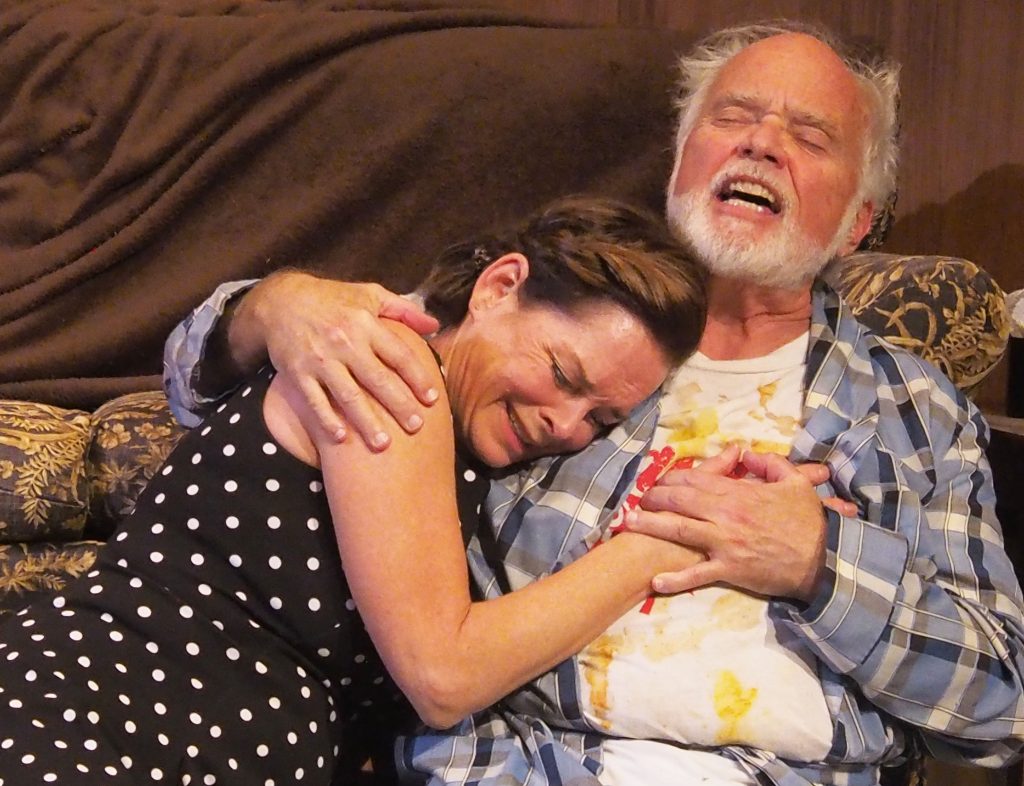68 Is the New 70 in ‘Decrepitude Blues’

Content warning: ‘Decrepitude Blues’ contains topics of suicide and substance abuse. While they are not discussed in this review, they are present in the production and may be distressing for some audience members.
If you or someone you know is struggling, support is available. Call or text 988 for Talk Suicide Canada (24/7). You are not alone.
When I was a child, a family friend who happens to be a doctor once cautioned me to “be careful, because at a certain age you stop healing from wounds and you start just collecting them.” Warren Winters (Phil Perrin) has reached that age, and is really beginning to find the troubles that come with it. Decrepitude Blues follows Warren through doctor’s checkups and the loss of his job, friends, and wife, all the while highlighting the hardships of turning 70 with dry wit erupting at each new low.
The show, written by Kingston’s own Douglas Bowie and directed by Liz Schell, has just made its world premiere at Domino Theatre. This is Domino’s second time producing a work by Bowie following Rope’s End in 2009, and as far as I can tell, it is their first time producing a premiere of an entirely new script in their main season for at least a decade. To open the show on Thursday evening, Domino Theatre President Douglas McNichol gave a brief speech emphasizing that we were “the first ever audience to see this play outside of the rehearsal room.” It’s an exciting change of pace for the lineup, and choosing a script by a playwright with as extensive a career as Bowie helps to eliminate many of the usual risks associated with producing a new show.
The play opens with a citation of Murphy’s Law: “Anything that can go wrong will go wrong.” Suddenly, lights rise on Warren receiving a physical from his Doctor (Naomi Priddle Hunter) with Warren cracking “Murphy was an optimist.” The repartee of Perrin and Hunter in this scene is electric. The Doctor provides worsening and worsening diagnoses as Warren retorts and mocks her with dark dry humour, leaping in tone between absurd, pessimistic, and at times misanthropic.
It is in these early scenes of everyday life that Bowie’s writing thrives, especially through Warren’s sardonic humour. Our protagonist still remains sympathetic, as there are moments of humanity which identify his curmudgeonly exterior as a means of coping with some of the more difficult realities of his age. The first 30 minutes follow a loose slice of life structure highlighting these struggles, where each scene begins with a similarly titled and themed anecdote to Murphy’s Law (Farnsdick’s Rule, Sturgeon’s Law, etc.). It’s a really well-crafted opening that introduces the lead perfectly, offering insights into his life, and it keeps you laughing even when things seem so grim.
Following the loosely structured opening, the play takes a twist you’ll have to catch the show to learn. A more solid plot is introduced that hijacks the remaining three quarters of Decrepitude Blues, which unfortunately ends up being one of the show’s biggest issues. It shifts the focus away from the everyday truths of growing older—which make the first scenes so appealing—towards a higher stakes, more immediate issue. The dialogue still maintains the brilliant wry humour, but removing it from the routine situations (where it acted as a charming method of ignoring omnipresent issues) leaves it feeling out of place and unnatural.
The cast consists of six performers who all are well suited to their parts, however I cannot help but wonder why they felt the cast size was necessary. There are never more than two characters on stage at one time, so doubling would have been a simple solution especially considering that about half of the cast only appear for 10 minutes each in the show’s two hour run.
Still, the production itself is quite charming. The set, designed by Bob Brooks, offers a flexible playing space that manages to represent the multitude of settings present in the play. The stage is seemingly split into three individual sections, with two of them having rotating mechanics that make them easier to completely transform, and then the third area being a permanent and more detailed setting in Warren’s home.
The show relies heavily on Perrin, who is constantly on stage as the lead, and his energy never dwindles for even a moment. He tactfully navigates the delivery of Warren’s constant quips, and really sells the man behind the gruff exterior. Smaller comedic parts of the ensemble also offer some of the best moments. A personal favourite I referenced earlier being Hunter as Warren’s doctor. She has a dry and tired delivery which really suits interactions with her ever-pessimistic patient.
Decrepitude Blues’ charm lies in what it has been advertised as: a comedic insight into the trials and tribulations of getting older. Bowie’s writing offers witty dialogue that will have you chuckling from beginning to end, even if the surprise plot is staler than the slice of life comedy you get a glimpse of in the beginning. The show closes out the Domino’s 24/25 season and despite its pitfalls, it is worth the trip to catch a talented cast delivering the sharp humour of a local pro.
‘Decrepitude Blues’ runs at Domino Theatre until June 21, 2025. Tickets and more information can be found here.
